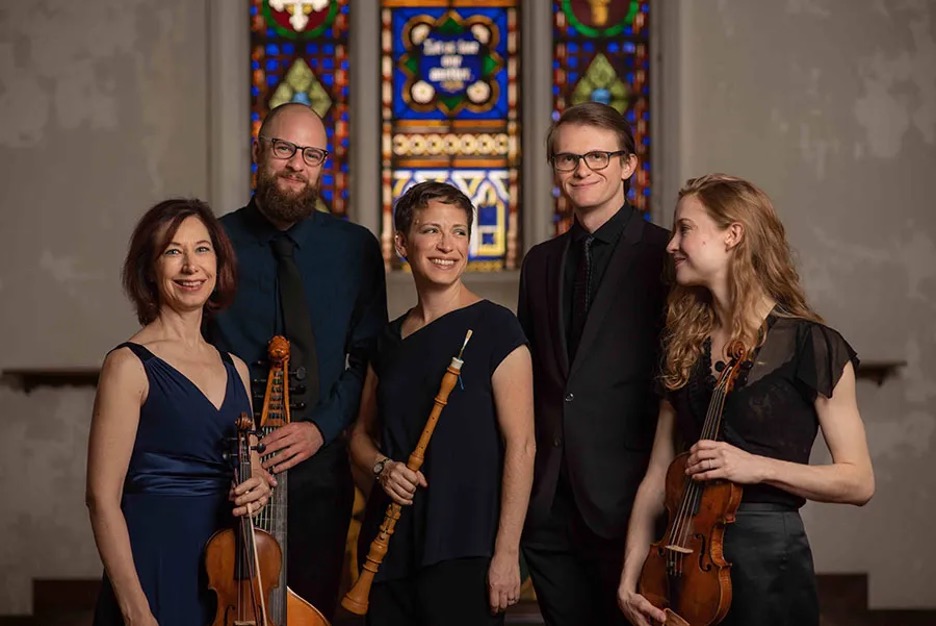By Daniel Hathaway
Saturday afternoon, Daniel Reith will lead The Cleveland Orchestra in a “sensory friendly” concert at Severance Music Center specially designed for attendees on the autism spectrum. Activities include an instrument petting zoo, coloring stations, and photo opportunities.
Also on Saturday afternoon, Les Délices (pictured) will celebrate the release of two CDs at Bottlehouse Brewery. The period instrument ensemble will also perform on the Music From the Western Reserve series in Hudson Sunday at 5.
Saturday evening includes a Baldwin Wallace alumna recital by soprano Jennifer Rowley, a Cleveland Jazz Orchestra performance at the Maltz featuring trumpeter and vocalist Bria Skonberg, an Oberlin Jazz Ensemble concert, a Canton Symphony Pops concert with the Labra Brothers, and the third of four performances of Britten’s Albert Herring by Oberlin Opera Theater (final performance on Sunday afternoon).
The Verona Quartet will play on the Wooster Chamber Music Series Sunday afternoon, and other performances include the Contemporary Youth Orchestra (with Tri-C Film Academy), and vocalists and cellists on the Sounds of St. James series in Lakewood.
For details of these and other events, visit our Concert Listings.
NEWS BRIEFS:
The Musicians of the Canton Symphony Orchestra, members of the American Federation of Musicians, Local 111, “have overwhelmingly authorized a strike.
“The authorization allows the Union to declare a strike should it deem necessary, although the musicians’ Orchestra Committee will continue to negotiate with the Canton Symphony Orchestra Association (CSOA), using the Federal Mediation and Conciliation Service.
“The musicians seek wages that mitigate record inflation since 2021, as well as basic job security and working conditions aligned with most professional orchestras in the country.”
Read the musicians’ press release here.
WEEKEND ALMANAC:
November 4: By Mike Telin
Today we remember composer, organist, pianist and teacher Gabriel Fauré, who died in Paris on 4 November 1924 at the age of 79. Recognized as one of the most influential French composers of his time, his musical style inspired many 20th-century composers. The Grove Dictionary of Music and Musicians, describes him as the most advanced composer of his generation in France, and notes that his harmonic and melodic innovations influenced the teaching of harmony for later generations.
Born in Pamiers, Ariège, in the south of France on May 12, 1845, his musical talents were revealed while he was still a boy. As a nine-year-old he was sent to the Ecole Niedermeyer music college in Paris, where he was trained to be a church organist and choirmaster. It was there that he met Camille Saint-Saëns, who would become a lifelong friend.
Following his graduation Fauré earned his living as an organist and teacher — leaving him little time for composition. He would later hold the post as organist of the Église de la Madeleine and go on to become the director of the Paris Conservatoire.
Fauré was a founding member of the Société Nationale de Musique, formed in 1871 with the mission of promoting new French music. The membership included Romain Bussine, Saint-Saëns, Georges Bizet, Emmanuel Chabrier, Vincent d’Indy, Henri Duparc, César Franck, Édouard Lalo and Jules Massenet.
Maurice Ravel dedicated his String Quartet to Fauré, a respected teacher and mentor. Even after his retirement from the Conservatoire at the age of 75, he continually made himself available to young composers, including members of Les Six.
In a centenary tribute the musicologist Leslie Orrey wrote in The Musical Times that Fauré’s music is “More profound than Saint-Saëns, more varied than Lalo, more spontaneous than d’Indy, more classic than Debussy, Gabriel Fauré is the master par excellence of French music, the perfect mirror of our musical genius.”
Perhaps Fauré’s most well-known work is his Requiem Op.48. Click here to listen to Robert Shaw leading the Atlanta Symphony and Chorus with Judith Blegen, soprano, and James Morris, baritone.
November 5:
On this date in 1494, German Meistersinger Hans Sachs was born in Nuremberg. A shoemaker by trade, he wrote over 4,000 Meisterlieder, poems, tragedies, comedies, fables, and religious tracts, having become an enthusiastic follower of Martin Luther. That earned him the opprobrium of the town council until Nuremberg signed on to join the Reformation.
Sachs is portrayed in Richard Wagner’s opera Die Meistersinger von Nuremberg. Watch the Act I scene, “Beckmesser’s Judgment and Sachs’ Rebuttal,” from a 1970 Hamburg State Opera production in which Giorgio Tozzi plays Hans Sachs.
November 5, 1989 marked the death of Ukrainian-born pianist Vladimir Horowitz. He ended his concert career two years earlier at the age of 84, but not before giving spectacular recitals in Vienna (Klavierabend in the Goldener Saal at the Musikverein) and Hamburg (his last public appearance).
And American composer Elliott Carter died on this date in 2012 at the age of 103 in New York, having written more than 20 works since reaching the century mark. He was the subject of a Classical Nerd episode, The Uncompromising Elliott Carter (watch here), and his last interview was a conversation with cellist Alisa Weilerstein.
For a taste of Carter’s later, modernist works, follow along with the score while pianist Ursula Oppens plays his 1980 Night Fantasies, and watch 2009 Cleveland International Piano Competition laureate Sean Chen perform his Caténaires.
CIM New Music Ensemble flutist Alexandria Hoffman, oboist Devin Hinzo, cellist Joseph Teeter, and harpsichordist Taylor Flowers performed his 1952 Sonata in Mixon Hall on February 7, 2018.
While many admire the composer’s later works, others find charm in Carter’s earlier, neoclassical pieces. Here are two:
The USC Thornton Chamber Singers programmed his 1945 setting of Emily Dickinson’s Musicians Wrestle Everywhere on its May 2, 2013 concert, “Americans in Paris: The Legacy of Nadia Boulanger.”
And the Harvard Glee Club recorded Carter’s 1947 work, Emblems, on poetry of Alan Tate, on its 150th Anniversary Tour in Cincinnati in March, 2010. Carter dedicated the work to G. Wallace Woodworth and the HGC. Here, assistant conductor Michael McGaghie conducts the ensemble.




